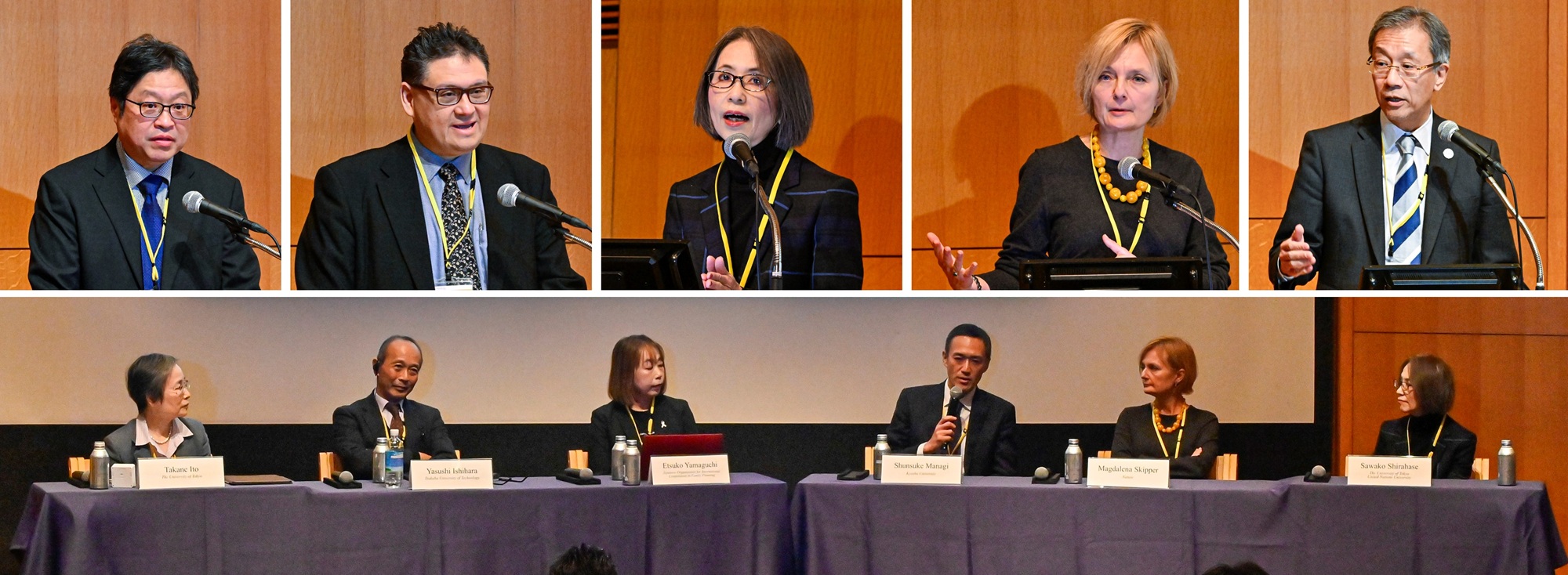Event report on the SDGs Symposium 2025 Tackling Inequalities for Sustainability and Wellbeing

The University of Tokyo held jointly with Springer Nature a symposium on the interface of inequality and Sustainable Development Goals (SDGs) on 8 February 2025. This was the sixth SDGs Symposium by the University of Tokyo and Springer Nature, following five symposia in 2019, 2021, 2022, 2023 and 2024, with each symposium focusing on different SDGs. The 2025 symposium focused on “Gender Equality” (SDG5), “Reduced Inequalities” (SDG10) and “Partnerships for the Goals” (SDG17), and their intersections with other SDGs. This reflected the consensus between the organizing teams that the pervasive and emerging inequalities observed globally have important ramifications for sustainability and human wellbeing. Income, gender, age, race, ethnicity or disability are only some of the dimensions of inequality that create such risks and must be tackled to ensure that we transition to a truly sustainable future. In this context, there are growing calls to develop and implement inclusive knowledge and actions to reduce inequalities for the benefit of individuals, societies and the planet as a whole. Transformative actions seeking to reduce inequalities would require transdisciplinary research to shape conversations within academic communities and the wider public.
To reflect these realizations, the 2025 SDGs Symposium brought together leading researchers working on different aspects at the interface of inequalities, sustainability and wellbeing. There was special attention given to achieving inclusivity among the speakers, in terms of disciplines, affiliation and gender.
The Opening Remarks were jointly delivered by Prof. Kensuke Fukushi (Director, Institute for Future Initiatives, The University of Tokyo) and Dr. Antoine Bocquet (Managing Director, Springer Nature Japan). They set the tone of the 2025 SDGs Symposium, emphasizing that strong links between inequalities, sustainability and wellbeing, and how current global circumstances and rising inequalities can have grave consequences for ourselves and future generations.
In the first Keynote Presentation, Dr. Sawako Shirahase, Project Professor, The University of Tokyo/Senior Vice President, United Nations University outlined key conceptualizations and patterns of global inequalities from the perspective of gender and age. Furthermore, she emphasized that in the face of such inequalities we need to establish new social contracts if we are to achieve the SDGs. In the second Keynote, Dr. Magdalena Skipper, Editor-in-Chief, Nature, Chief Editorial Advisor, Nature Portfolio, highlighted the role of science and publishing in tackling inequalities. She pointed to the need to focus on inclusivity and champion diversity in research and publishing if we are to generate knowledge that can tackle pervasive and emerging inequalities.
The three Plenary Presenters outlined different critical issues related to interactions between inequalities, sustainability and wellbeing. First, Dr. Shunsuke Managi, Distinguished Professor, Kyushu University, discussed how new technologies and alternative measures of wellbeing such as the Inclusive Wealth Index can help bridge some of the gaps in current research on wellbeing and sustainability considering the current inequalities. Then, Dr. Yasushi Ishihara, President, Tsukuba University of Technology, highlighted some of the educational philosophies and initiatives at his university that aim at enhancing the inclusivity of disabled students within Japanese society. Finally, Ms. Etsuko Yamaguchi, Executive Director, Japanese Organization for International Cooperation in Family Planning (JOICFP), outlined her organization’s approach to navigating local inequalities through community-based approaches when providing interventions seeking to improve sexual and reproductive health in the Global South.
Given the very broad spectrum of inequalities and what they encompass, the thematic focus of each Keynote and Panel Presentation was deliberately selected to reflect different aspects of the interface between inequalities, sustainability and wellbeing using different disciplinary lenses. This created an overview of major observed patterns, research challenges and key research priorities at this interface.
Finally, Dr. Takane Ito. Director and Project Professor, UTokyo Center for the Coproduction of Inclusion, Diversity and Equity (IncluDE), coordinated a panel discussion consisting of all participants. This panel discussion provided insights based on the experience of the speakers engaging with different elements of inequalities and the SDGs. The main topics that were discussed during the Panel included (a) how transdisciplinarity for inequality research can be promoted and (b) what are important considerations to design and implement inclusive solutions to reduce inequalities within and between societies.
The Symposium concluded with the Closing Remarks provided by President Teruo Fujii of the University of Tokyo. The remarks focused on major ramifications of inequalities for sustainability and wellbeing, why transdisciplinary approaches are critical to develop appropriate responses, and major relevant initiatives currently implemented within the University of Tokyo.
There were 378 participants from around the world who attended the 2025 SDGs Symposium. A basic breakdown of the participants shows that 110 attended in person, and 268 online from 28 countries. Approximately 70% of the online audience joined from Japan and 30% from other countries. The countries with the most participants besides Japan were India (15 participants), the Philippines (11 participants), Indonesia (9 participants), Pakistan (6 participants) and the United States (5 participants). Beyond academic and research institutions, many participants were affiliated with the private sector, government agencies and civil society, suggesting the transdisciplinary appeal of the event. A large number of registrants were students and early-career researchers, though the actual numbers that attended cannot be estimated accurately with the information tracked during the event.
Following the SDGs Symposium, a networking and poster session was held, where undergraduate and postgraduate students from the University of Tokyo and other universities in Japan and abroad presented their work to the speakers and the audience. In total, 14 posters covering different aspects of the SDGs research were presented: 6 posters from students of the University of Tokyo and 8 posters from students of other universities in Japan and abroad. During the poster session, students received feedback and encouragement from the speakers of the Symposium.

Photography:
[TOP] From left, Director Fukushi, Dr. Antoine Bocquet (Managing Director, Springer Nature Japan), Dr. Shirahase, Dr. Skipper, President Fujii
[Bottom] Panel Discussion (from left, Dr. Ito, Dr. Ishihara, Ms. Yamaguchi, Dr. Managi, Dr. Skipper, Dr. Shirahase)
To reflect these realizations, the 2025 SDGs Symposium brought together leading researchers working on different aspects at the interface of inequalities, sustainability and wellbeing. There was special attention given to achieving inclusivity among the speakers, in terms of disciplines, affiliation and gender.
The Opening Remarks were jointly delivered by Prof. Kensuke Fukushi (Director, Institute for Future Initiatives, The University of Tokyo) and Dr. Antoine Bocquet (Managing Director, Springer Nature Japan). They set the tone of the 2025 SDGs Symposium, emphasizing that strong links between inequalities, sustainability and wellbeing, and how current global circumstances and rising inequalities can have grave consequences for ourselves and future generations.
In the first Keynote Presentation, Dr. Sawako Shirahase, Project Professor, The University of Tokyo/Senior Vice President, United Nations University outlined key conceptualizations and patterns of global inequalities from the perspective of gender and age. Furthermore, she emphasized that in the face of such inequalities we need to establish new social contracts if we are to achieve the SDGs. In the second Keynote, Dr. Magdalena Skipper, Editor-in-Chief, Nature, Chief Editorial Advisor, Nature Portfolio, highlighted the role of science and publishing in tackling inequalities. She pointed to the need to focus on inclusivity and champion diversity in research and publishing if we are to generate knowledge that can tackle pervasive and emerging inequalities.
The three Plenary Presenters outlined different critical issues related to interactions between inequalities, sustainability and wellbeing. First, Dr. Shunsuke Managi, Distinguished Professor, Kyushu University, discussed how new technologies and alternative measures of wellbeing such as the Inclusive Wealth Index can help bridge some of the gaps in current research on wellbeing and sustainability considering the current inequalities. Then, Dr. Yasushi Ishihara, President, Tsukuba University of Technology, highlighted some of the educational philosophies and initiatives at his university that aim at enhancing the inclusivity of disabled students within Japanese society. Finally, Ms. Etsuko Yamaguchi, Executive Director, Japanese Organization for International Cooperation in Family Planning (JOICFP), outlined her organization’s approach to navigating local inequalities through community-based approaches when providing interventions seeking to improve sexual and reproductive health in the Global South.
Given the very broad spectrum of inequalities and what they encompass, the thematic focus of each Keynote and Panel Presentation was deliberately selected to reflect different aspects of the interface between inequalities, sustainability and wellbeing using different disciplinary lenses. This created an overview of major observed patterns, research challenges and key research priorities at this interface.
Finally, Dr. Takane Ito. Director and Project Professor, UTokyo Center for the Coproduction of Inclusion, Diversity and Equity (IncluDE), coordinated a panel discussion consisting of all participants. This panel discussion provided insights based on the experience of the speakers engaging with different elements of inequalities and the SDGs. The main topics that were discussed during the Panel included (a) how transdisciplinarity for inequality research can be promoted and (b) what are important considerations to design and implement inclusive solutions to reduce inequalities within and between societies.
The Symposium concluded with the Closing Remarks provided by President Teruo Fujii of the University of Tokyo. The remarks focused on major ramifications of inequalities for sustainability and wellbeing, why transdisciplinary approaches are critical to develop appropriate responses, and major relevant initiatives currently implemented within the University of Tokyo.
There were 378 participants from around the world who attended the 2025 SDGs Symposium. A basic breakdown of the participants shows that 110 attended in person, and 268 online from 28 countries. Approximately 70% of the online audience joined from Japan and 30% from other countries. The countries with the most participants besides Japan were India (15 participants), the Philippines (11 participants), Indonesia (9 participants), Pakistan (6 participants) and the United States (5 participants). Beyond academic and research institutions, many participants were affiliated with the private sector, government agencies and civil society, suggesting the transdisciplinary appeal of the event. A large number of registrants were students and early-career researchers, though the actual numbers that attended cannot be estimated accurately with the information tracked during the event.
Following the SDGs Symposium, a networking and poster session was held, where undergraduate and postgraduate students from the University of Tokyo and other universities in Japan and abroad presented their work to the speakers and the audience. In total, 14 posters covering different aspects of the SDGs research were presented: 6 posters from students of the University of Tokyo and 8 posters from students of other universities in Japan and abroad. During the poster session, students received feedback and encouragement from the speakers of the Symposium.

Photography:
[TOP] From left, Director Fukushi, Dr. Antoine Bocquet (Managing Director, Springer Nature Japan), Dr. Shirahase, Dr. Skipper, President Fujii
[Bottom] Panel Discussion (from left, Dr. Ito, Dr. Ishihara, Ms. Yamaguchi, Dr. Managi, Dr. Skipper, Dr. Shirahase)






